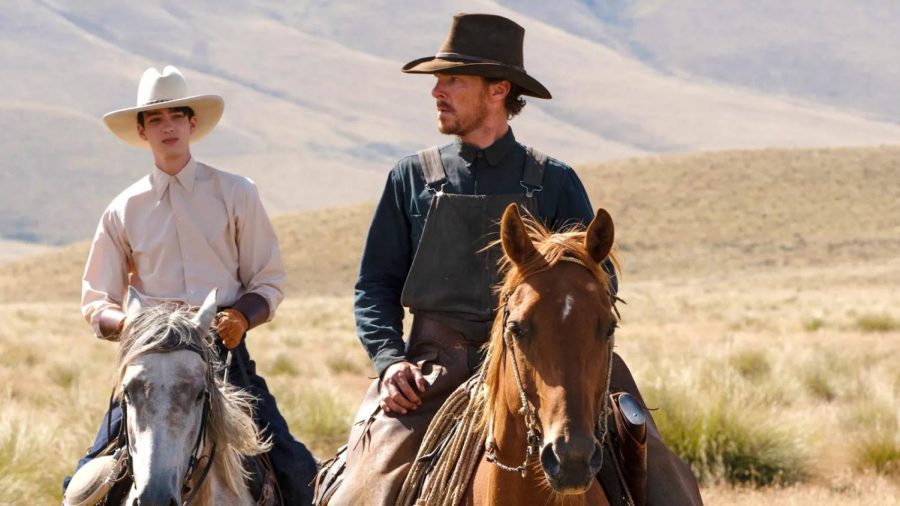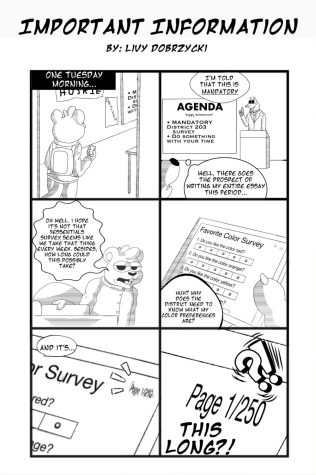Spoiler-free The Power of the Dog review: over-nominated or a Campion return?
It’s that time of the year again. On Sunday, March 27, the academy is set to award Oscars to the best films and actors of the year in their respective categories. You’ll definitely catch me on my couch at 7 p.m. CST, anxiously awaiting the results of what I consider my personal Super Bowl. It’s no doubt that the film industry has struggled these past two years, with critically acclaimed films like ‘Drive My Car,’ but I’m happy to announce that we aren’t short of great films released in 2021. With the pause of theatrical showings in early quarantine, online streaming has grown even more popular, giving more light to site originals. By far, one of the most significant originals of 2021 would be Netflix’s The Power of the Dog.
Director Jane Campion’s slow-burn midwestern received the most Oscar nominations of any movie this year with 12, including best picture, adapted screenplay and cinematography. IMDb rated it a 6.9/10, Rotten Tomatoes a 93% and Letterboxd a 3.7/5. So the question is: are those 12 nominations warranted?
‘The Power of the Dog’ is adapted from a novel of the same name by Thomas Savage. When rancher Phil Burbank learns of his brother’s marriage to a suicidal widow, his domineering nature grows and he acts towards them with cruelty. It’s a very character-driven film as you follow their development, for better or worse.
I’ve always considered characters to be the biggest factor when deciding whether I like a film or not. The four most important characters not only stand on their own as incredibly interesting, but are successful character foils. What makes it even better is that the actors’ portrayals of them were outstanding! In fact, all four were nominated for best actor in their respective roles. Benedict Cumberbatch (Phil Burbank) was nominated for best actor in a leading role, Kirsten Dunst (Rose Gordon) for best actress in a supporting role and both Jesse Plemons (George Burbank) and Kodi Smit-McPhee (Peter Gordon) received a spot in best actor in a supporting role.
“The Power of the Dog” was also nominated for best original score. I’ve seen plenty of users on the movie-rating app Letterboxd praising Johnny Greenwood’s score for the film as well. But the Academy definitely has a streak of odd, or even wrong choices in this case. Every time a cello or piano started playing random, goofy notes in the background, I was instantly taken out of the moment in the film. There’s a difference between obscure music meant to unsettle the viewer and random sounds with no purpose. There’s no musicality to it. To make things worse, a majority of the tracks simply didn’t fit the scene in play — not the chords or the rhythms. Even the volume in comparison to the ambient sound and dialogue was grating.
At least the diegetic music (music that actually plays within the setting) was used decently and added to progressing the ideas of the film. I personally loved the scene between Rose and Phil, in which Rose attempts to successfully play the piano only to be interrupted by Phil’s expert banjo skills playing the same song. Within the film you learn that Rose constantly feels like a failure, in contrast to Phil’s confidence which he attempts to impose on her and his brother. It’s pretty fantastic characterization and one of the only times music works in the film’s favor.
Though I doubt Ari Wegner will win the award for cinematography, it was definitely a strength of the film. Many angles added to the symbolism of the scene and the characters in focus, just as good cinematography should. Oddly enough, there was a shot that actively bothered me when a group of diners were celebrating and playing a piano, shown from a medium distance, but there was something blocking a bit of the screen, or rather just cutting through it diagonally. I couldn’t tell you what it was, which shows how unimportant that irritating object was. If that was removed, it would have been a great perspective, the tables and characters set in places appealing to the eye. What a shame. There were also lots of shots that followed ranchers working with cattle, which felt like filler at first, but ended up making quite a bit of sense at the end. I particularly liked a lot of the long, establishing shots that took advantage of the beautiful setting, some of the more important scenery being shown repeatedly throughout the movie.
The movie tackles some hidden themes that could be considered controversial, with a couple of characters implied to be closeted homosexuals. I say controversial solely due to the fact that yes, bigots still exist. Though it’s no “Moonlight” when it comes to the significance and courage of presenting these themes, I appreciate that homosexuality is used as both a point of connection between two characters and reasoning behind a character’s actions. As a non-heterosexual person myself, I’m always happy to see more representation in a way that avoids stereotypes.
In the end, I’d argue that 12 Academy Award nominations are too many, but Campion came back with power. Slow burn films are often my favorite, and this was no exception. “The Power of the Dog” is a study of multiple characters, highlighted by some nice shots and fantastic acting. But it falls short in the musical aspect to the point where it greatly affects my opinion of the movie. There’s also just not much that’s too special about the film aside from those aspects. It’s definitely worth a watch for those who enjoy slower, character-heavy films, and anyone with an interest in film in general.

Livy is the Sound Engineer for The North Star. She is hoping to spend her last year at Naperville North writing reviews, editorials, and of course, work...
















